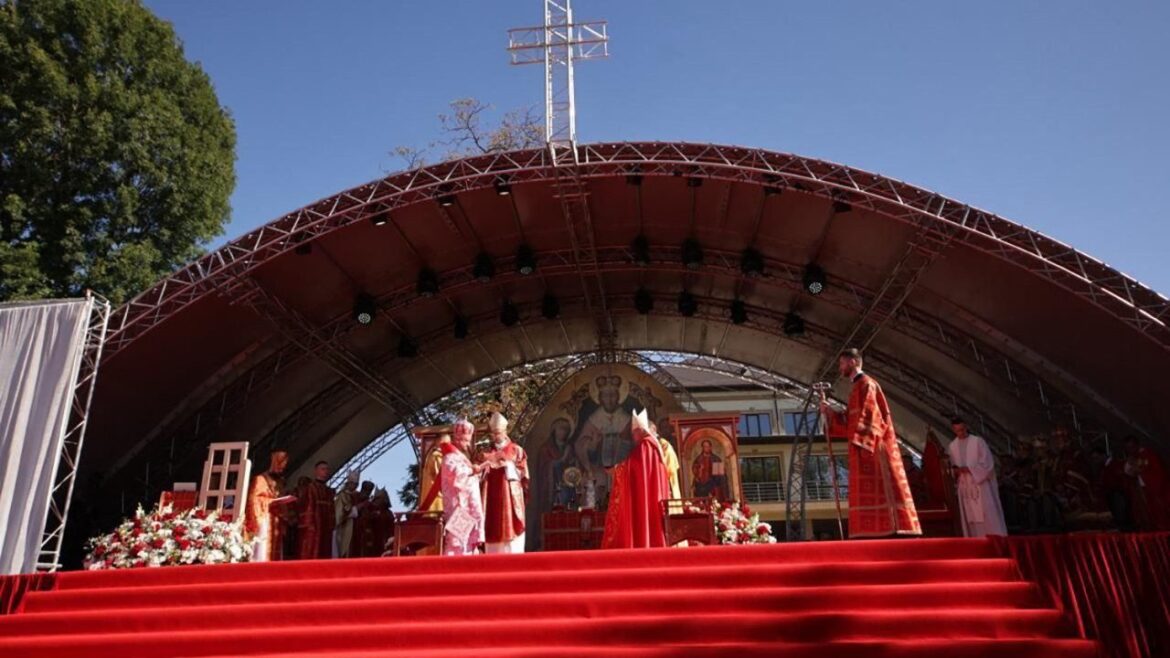On Saturday morning of 27 September in Bilky, Ukraine, the Divine Liturgy was celebrated for the beatification of a priest who was martyred under the communist regime, killed in 1953 at just 36 years old. Cardinal Grzegorz Ryś, representing Pope Leo, recalled how the new Blessed became a “bridge” amidst divisions and conflicts.
Vatican News
“In today’s world, torn apart by terrible wars, more divided than ever before, where people have lost the ability to truly meet one another and suffer from deep loneliness, we need people of genuine encounter and communion, like Father Pietro Paolo Oros.” With these words, Polish Cardinal Grzegorz Ryś, Archbishop of Łódź and papal representative, described the priest of the Byzantine Rite Eparchy of Mukachevo, who was martyred in 1953 and beatified on Saturday morning, 27 September, in Bilky, Ukraine. This long-awaited event — repeatedly postponed due to both the war in Ukraine and the death of Pope Francis — was also recalled by Pope Leo XIV during Saturday’s Jubilee audience in St. Peter’s Square.
A life marked by charity
Speaking of the new Blessed, who was killed by the communist regime at just 36 years of age, Cardinal Ryś recounted his short but deeply meaningful life, entirely devoted to goodness, mercy, and charity. “Today we proclaim blessed a martyr for whom the cross was not only his death, but his entire life,” the Cardinal emphasized, highlighting Oros’s “deep faith and spirituality”, noting that his knees were “hardened like soles from so much prayer.” He died on his knees, carrying the Blessed Sacrament to a sick person.
Teaching by example
The Cardinal added that “he did not teach through written words, but through his life, through his example.” None of his many homilies or catecheses have survived in written form. And yet, many still remember his “doing good.” In Father Oros, the Pope’s representative continued, poverty and charity “came together as one attitude, like two sides of the same face. He was poor because he gave, and he gave because he knew how to be poor.” In the rectories where he lived, “there was nothing but a simple table and a few chairs.” Everything he received, he gave away — embracing humanity “in all its needs: from the deepest and spiritual to the most basic and material.” He believed that those in need should “always receive the best, the new.”
Practicing mercy in times of war
Reflecting on his example, Cardinal Ryś addressed the Ukrainian faithful with a powerful and timely message: “You, who for many years have endured aggression and war; you, who have lost not only your homes and possessions, but also what is priceless — the lives and health of your loved ones and yourselves — it is natural for you to expect help and support from everyone.” But, he added, “right now, in such dramatic circumstances, when you have every right to think first of yourselves, Blessed Father Pietro tells you: ‘Be merciful!’”
A spirituality of encounter
Finally, Cardinal Ryś highlighted the “rich spirituality of encounter” lived by the new Blessed, “who breathed with both lungs of Christianity — the Eastern and the Western.” In doing so, he became a “bridge” between two worlds, even in difficult contexts. “We all need bridges,” the Cardinal stressed, “but we also know that in times of war, bridges are always the first to be bombed. To be a ‘bridge’ means to be someone who unites, not divides — someone who ‘turns swords into ploughshares,’ who turns weapons into tools for shared work.” “Father Pietro was able to speak a common language with everyone: with Latin or Byzantine Catholics, with Orthodox, and even with atheists.”
A youth pilgrimage to celebrate the new Blessed
The life of the new blessed, along with that of his fellow priests who were “arrested, persecuted, tortured, killed, or died in prison,” Cardinal Ryś concluded, “teaches us a love that is powerful and radical, both in life and in death.” On 26 September a pilgrimage of around one thousand young people made their way on foot to Bilky ahead of the beatification, which culminated in the Divine Liturgy led by Auxiliary Bishop Nil Yuriy Lushchak, a Franciscan, of the Byzantine Rite Eparchy of Mukachevo.



